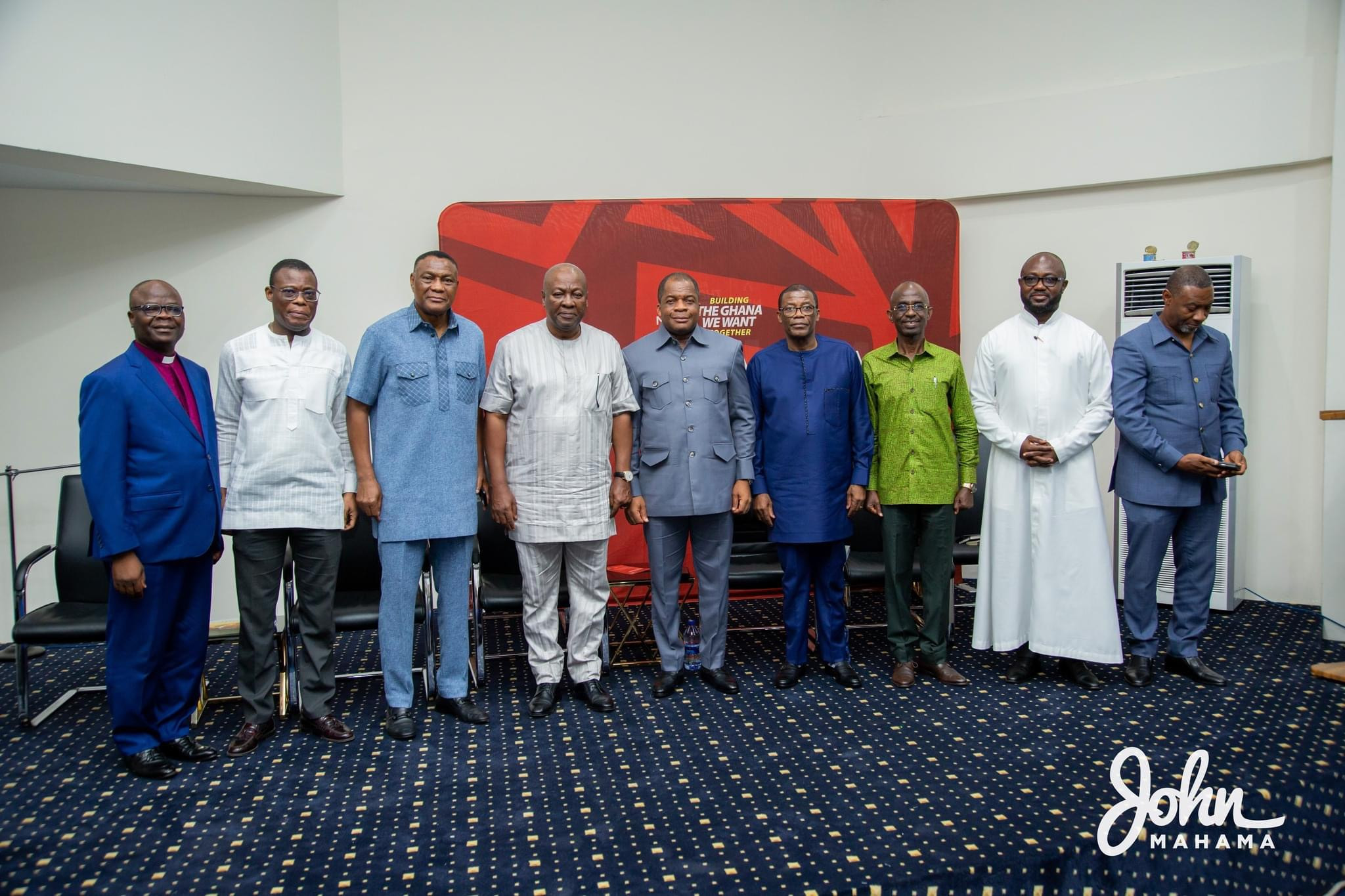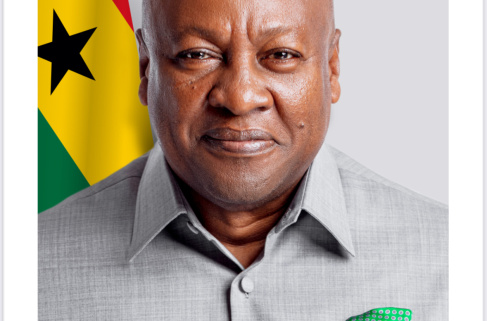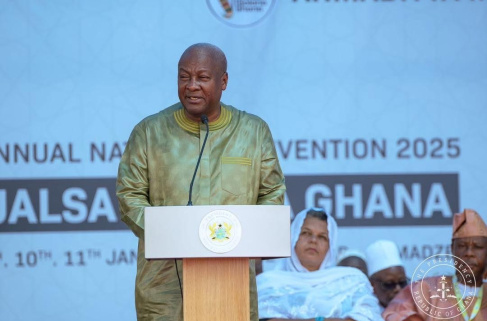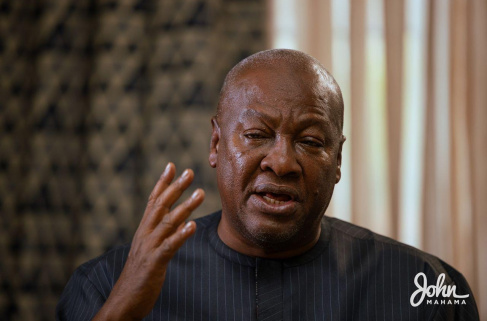


2024-05-21
This morning’s conversations, after the media takes leave of us, will be geared towards discussing the future of our beloved nation ahead of the 2024 elections.
As we all know, Ghana is at a critical juncture, and the decisions we make in the upcoming elections will shape the trajectory of our nation for years to come. The importance of effective leadership cannot be overstated, especially in these challenging times.
The Bible reminds us in Proverbs 29:2 that "when the righteous thrive, the people rejoice; when the wicked rule, the people groan." This verse underscores leadership's profound impact on the well-being of a nation and its people.
Throughout the Bible, we are also presented with stories of leaders who guided their people with wisdom, compassion, and courage. From Moses's leadership in leading the Israelites out of Egypt to Jesus Christ's teachings, we are constantly reminded of the qualities that make for effective and righteous leadership.
My message to the good people of Ghana has been the need to reflect on the importance of choosing leaders who embody these qualities and are committed to serving our nation's and its people's best interests. Let us also consider how we, as members of the Christian community, can actively support and advocate for leadership rooted in the principles of justice, honesty, fairness, and compassion.
Education
The first schools in this country were established by the churches, and even today, most of the best-performing schools were the ones established by the churches. They are better performing because, in most cases, they are managed under the auspices of the church.
The state and the church are partners because we have a common objective: to provide quality education to our young people and to ensure that education is affordable. The church and the state have an objective, and we cannot be adversaries in this common objective. So, the state and the church must partner and work together.
Many of the mission schools were made public schools because the government was in a position to invest in and expand the facilities. We must find a way to take advantage of the efficiency of the church’s management of the schools and the government’s investment in them.
As part of the national dialogue that I have promised on education, this is one of the issues that would be discussed and come to a permanent arrangement on how the church and the state collaborate. We are proposing an increase in the church's influence in school management in the future.
We will ensure, for instance, that the chairman of the school's governing board is a member of the church that established the school and that there are representatives of the church on the governing board. The church should play an important role in selecting the head of the school.
This proposal will be part of the national dialogue on improving educational outcomes. Our educational system faces a crisis today, and we must admit it. We must consider how we can continue to make education affordable while ensuring that we do not compromise quality in our quest.
Health
It is the same in the health sector. The churches are very active in establishing health institutions. Again, the government and the religious bodies have the same objective: to provide quality health care for our people. We cannot, therefore, be adversaries.
When I was president, I announced that where we have a properly functioning mission hospital, we will not establish a government hospital in the community. We can use the money that will be spent to establish a new hospital to expand the mission hospital's facilities so that it continues to provide the people with service.
Unfortunately, under the Agenda 111 projects, that is not happening. In some places, there are well-functioning hospitals managed by religious bodies, and yet the government has gone to start constructing a hospital—investing a lot of money into building a whole new hospital when we could have invested the money into the existing hospital managed by the church.
This creates duplication of efforts and resources. We need to look at this, and I think we must forge a new partnership in the health management system between government and church-run hospitals. In most cases, the hospitals run by churches are better managed than those run by the Ghana Health Service in our communities, so how can we involve religious organisations?
Economy and corruption
Ghana’s economy is on its knees now.
When we went to the IMF during my tenure, it was for just one request—policy credibility—and not because we were not capable of managing our affairs or paying our debt. Our partners wanted us to go to the IMF so that we would have policy credibility and follow through on our fiscal discipline promises.
This time, we went to the IMF for two reasons. Because of the deficit and the state of our fiscal affairs, the second reason is that we have accumulated debts that we couldn’t pay. And so, we have a twin problem.
Unfortunately, the honeymoon has passed. There is a lack of confidence in the management of the economy, which is reflected in “the deterioration of the foreign exchange position”. The fundamentals are definitely weak.
We have defaulted on our debt repayments. Today, as we speak, we have a moratorium on our debt repayment. We are not paying any of the debts we owe, which are in both cedis and foreign exchange. You can imagine that we have a moratorium on debt repayment, and the cedi is still deteriorating. If we had to commit to repaying, the situation would be worse.
As one of the stakeholders in the competition to lead this country, we are watching all these indicators because we are most likely, by the grace of God and the votes of the Ghanaian people, to inherit whatever the current situation is if God grants us His favour and we come into office.
What is going on is our concern. We are playing our part as a minority to ensure it doesn’t get worse before we get the opportunity to come into office. Inflation is still above 20%. Our debt moved from GH¢ 120 billion at the end of 2016 to GH¢ 610 billion today. These are debts that we have deferred, not that they have been cancelled. We have a moratorium now, but debt repayments will kick in from 2025/ 2026.
We are not out of the woods; we face a very difficult situation, and the next government must do a lot to improve our economic fortunes. I believe in my party, the NDC, and the people I worked with. We have the people to turn this nation's fortunes around and put us back on track to where our forebearers expected us to be.
Today, Ivory Coast has overtaken us as the second biggest economy in West Africa. We need to turn that in as soon as possible. We have an administration that has run out of ideas on how to resolve the issues we face, so we need to think outside the box and see how we can salvage the situation.
We cannot allow the status quo to continue for the sake of Ghanaians and our country's future. Change must come. There must be an end to this decline and a restoration of stability to the economy so that Ghanaians and the working people can breathe a sigh of relief and not have their already inadequate incomes eroded by inflationary pressures.
Mahama will deliver realistic policies that will positively impact our economy and country. I will lead a team that will deliver the much-needed change. The flagship of that change is the 24-hour economy policy, a game-changer for the Ghanaian economy. It will benefit businesses, employment, and the enjoyment of the youth seeking jobs.
We will encourage all sectors— manufacturing, agri-business, digital start-ups, and all others—that investors in those sectors run a shift system that allows more people to be employed and allows them to increase their production, not only for the Ghanaian market but under the African Continental Free Trade Area for export into other markets.
The protocols have been signed, and the opportunities are there. So far, my information is that seventy-seven products have been registered under the African Continental Free Trade Area, which allows us to export to any African country tariff-free. We must increase the number of products we supply, from aluminium coils to electric cables. There are so many things that if we increase production, we can become a major supplier for the whole of Africa.
All the companies, manufacturers and others that operate in these sectors will be absorbed into the 24-hour system to increase their shifts and employ more people so that we can export. We will help them with tax incentives, such as lower corporate tax rates, tax exemptions, tax holidays, etc. We will also help with production costs by giving them Time-of-use electricity tariffs.
The 24-hour economic policy will be a cross-cutting policy that will impact all sectors of our lives, both public and private. The government's obligation is to ensure that government services are available to the private sector. For example, there should be no reason why one should not be able to clear his goods on a Saturday or Sunday.
The port works, and the ships arrive, but Customs doesn’t work, and the banks don’t operate on weekends. Yet, weekends are calculated in your demurrage. We shall vigorously pursue the 24-hour economy, amongst many other initiatives, as part of our broader vision and determination to increase economic growth, create jobs, and improve the quality of life for Ghanaians.
We will repair the damage done to our economy and create a brighter future for all Ghanaians. We will need the church's collaboration. I know the church has invested heavily in education and health, but I have not seen anywhere in the Bible that it says the church cannot invest in any sector of the economy.
As our tithes and offerings dwindle, we must consider increasing the church's revenue sources to continue the evangelism work that God commanded us to do. Our intention is to involve the church in investing in the economy and business creation.
One of the ticking time bombs of our country is youth unemployment. In 2016, it was 8.5 %, today it is 14.7% and growing. This means that many of the young people in our churches have a dwindling hope of getting employed.
Recent statistics are even more serious. They say your likelihood of finding a job worsens as you climb the educational ladder. Unemployment among people with tertiary degrees is higher than among those with secondary and pre-secondary education. That is why the church must join the private sector and government and invest in the economy. Because the church is faith-based and has strong moral ethics, you can probably manage business better than the government.
I believe the government can support the churches by providing credit at a cheaper rate and tax holidays. What kind of investment can you make with the current 30% and 32% interest rates? But if there is credit at a cheaper rate, the churches can take advantage of that.
Corruption
One issue that affects everyone is corruption, and our performance on the corruption perception index continues to deteriorate. Corruption has become normal, and those engaged in it seem to have the support and protection of the people in authority. As a result, cases of financial malfeasance, stealing, the cost of inflation, sole-sourced contracts, and projects that are funded but never completed are becoming more the norm than exemption.
Recently, members of parliament raised the issue of the Pwalugu multipurpose dam, which was supposed to be an almost $1 billion investment. The contract was awarded, and $12 million was paid to the contractor for absolutely no work done. I can cite so many cases. We will not leave here if I want to go through them.
I make a firm promise to you, my Christian fathers, that the administration I will lead will set a new standard in the fight against corruption. We will fight the canker of corruption and defeat it. We will retrieve stolen monies and hold government officials accountable.
We are not going to pursue just regime accountability. The norm has been that you hold only past government officials accountable for any corruption. We will not go witch-hunting the past government. If people were involved in malfeasance, they must be held to account. And if people in our administration follow the same path, they must also be held to account.
There will be zero tolerance for corruption. That is the only way we can get a handle on the canker of corruption.
Elections 2024
Finally, I will look at the 2024 election. We are preparing for the elections and believe that as moral voices of society, you must not take your eyes off the ball. The Electoral Commission is the arbiter, and the EC must not only be neutral but must also be seen as neutral and nonpartisan. Unfortunately, recent events do not give us confidence about this.
This is a president who is appointing politically exposed people into positions of trust, where they are supposed to be neutral and non-partisan. People who have been communicators and IT workers for the party are today commissioners of the electoral commission. How do you expect them to be neutral and fair in what is happening? People who were patrons of TESCON on campus are today commissioners of the electoral commission. How do you expect them to be neutral and fair in what is coming up?
It means that we must be vigilant and alert. We, as political parties, will use the instruments provided in the electoral code to ensure that the election is free and fair.
We will train our part agents and incentivise them to be vigilant on the day. We will ensure we are at the collation centre on time and witness the tally of the results. We will police the elections every step of the way. But sometimes, things are difficult to control.
For instance, our last complaint was about the recruitment of returning officers. We heard Hopeson on the radio say that they took NPP executives from Kumawu and brought them to the Ejisu by-election as returning officers.
There are pictures of some of them, who are executives. But we are unable to check it because the CI says that 14 days before an election, we are supposed to have the list of the returning officers and be able to raise an objection if we believe somebody is politically exposed, but we went to the by-election without the list of returning officers. So, it was possible for them to recruit people who were party activists as returning officers. Those are some of the difficulties that we face.
In the last elections, after we had all gone to the printing houses and we witnessed the printing of ballots, we signed off on it, packed all the ballot papers, our agents signed all that was going to other regions, and the trucks came and dispatched the ballots, only for one of our agents in one of the printing presses who couldn’t find his laptop bag went back, and found that they were still printing millions of ballots paper.
When he confronted them, they claimed we would use the ballot in case of a by-election, forgetting that all 10 candidates are on the printed ballots and the runoff is between only two people. The EC said, let's go and burn the ballot papers, but only God knows how many they had taken away already. During the election, we arrested people holding ballot papers and handed them over to the police, till today, no one has been prosecuted.
There are things we can do as a political party, but the EC must be fair and neutral and let the will of the people speak. That is where the influence and persuasion that you carry as Christian fathers and the moral voice of the nation come in—often, they think NDC are crying babies, but we want to wake up the conscience of the nation that the right thing must be done.
We will continue to play our part and raise the red flag whenever we think things are not going well. We think the church community should keep an eye on and be vigilant in ensuring the right thing is done.
Conclusion
We trust that by working together, we will ensure free, fair, and transparent elections on December 07, 2024. We must work together after 2024 to turn the fortunes of our country regarding the economy, education, healthcare, and all other sectors. We should work together to ensure that we create a meaningful and prosperous existence for our congregation and citizens.
God bless you.

Presidency Communications has released the official portrait of President John Dramani Mahama, which is available for download below. The portrait... [read more]

Pomadze, Ghana - President John Dramani Mahama has reaffirmed his commitment to reforming and strengthening the country’s justice system. Speaking... [read more]

Fellow citizens, my brothers and sisters. As we begin the new year 2025, Lordina and I wish each of you... [read more]